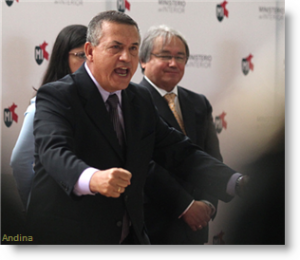
Interior Minister Daniel Urresti is under investigation for his role in the killing of a Peruvian journalist in the 1980s in Ayacucho, the Andean region that was at the center of a bloody conflict between the Shining Path rebels and state security forces.
The news that prosecutors are investigating Urresti’s connection to the murder of journalist Hugo Bustios almost 30 years ago was reported on for the first time Tuesday by Ideeleradio.
According to the Legal Defense Institute, documents in criminal court show that Urresti has been under investigation by the court since June 2013 for his alleged involvement in the murder. The court has yet to decide whether to charge the minister.
Urresti, a retired military general who was appointed barely nine days ago to head the Interior Ministry, later confirmed during a press conference that he is under investigation but said he was innocent.
Bustios, a correspondent in Ayacucho for news magazine Caretas, was killed on November 24, 1988 while reporting a story on the murder of civilians by the Shining Path.
The Shining Path, a leftist insurgency, reached its strongest point in the late 1980s and early 1990s as it waged a violent conflict to overthrow the state and install a Maoist-inspired regime. The rebels’ stronghold was Ayacucho, a strongly rural region in Peru’s southern Andes that also is home to one of the nation’s oldest universities, San Cristobal de Huamanga.
Peru’s military responded to the rebels with an iron-fisted counterinsurgency campaign that resulted in many rural, indigenous residents being caught in the middle of the battle between the state security forces and rebels. Some 70,000 people were killed nationwide during the conflict, according to the Truth and Reconciliation Commission report.
Bustios and colleague Eduardo Rojas, a correspondent with Revista Actualidad, were attacked by a group of soldiers dressed as civilians during their investigation into the civilian killings at Quinrapa, a small town in the district of Huanta. Bustios was blown apart by explosives, while Rojas survived the ordeal with a gunshot to the leg.
In October 2007, a criminal court found Col. La Vera and Lieutenant Colonel Amador Vidal guilty of murdering Bustios. It is believed that the officers targeted the journalist in retribution for a photo he took of La Vera, according to news website LaMula.pe. LaMula said that it was almost impossible to get pictures of military leaders in Ayacucho during the conflict.
At the time of the killing, Urresti was an intelligence officer stationed in Ayacucho. Urresti was allegedly the leader of the military patrol that ambushed the journalists. Four witnesses at the 2007 trial said that Urresti was one of the officers who shot at the journalists, but he was not charged.
An investigation into his alleged role in the killing of Bustios was opened by prosecutors last year.
Urresti told reporters on Wednesday that he is innocent.
“There isn’t one piece of evidence [against me],” he said. “I am completely innocent and my hands are clean of blood.”
Urresti also said that he told President Ollanta Humala of the investigation before he was appointed Interior minister.
“When the President called me to be a minister, I told him about the process, but that I have nothing to do with it,” he said.
Still, opposition politicians are calling for Urresti to resign only eight days after he took office.
“How can someone being investigated for the crime of that journalist direct the fight against insecurity?” questioned Omar Quesada, the institutional secretary of the opposition Apra party. “I think he should resign, and that way the justice can act without any type of pressure.”
The spokesman for Fujimori Fuerza Popular party, Hector Becerril, said Congress would take steps to remove Urresti if he doesn’t resign soon.
“If Humala doesn’t ask for it, then he should [resign],” Becerril said in comments to daily El Comercio. “If not, Congress will find a way to do so.”
President Humala was in Paris when the story broke, speaking at the fifth International Economic Forum on Latin America and the Caribbean.
Urresti is the sixth minister to lead the portfolio, which is responsible for overseeing domestic security issues and the national police.





